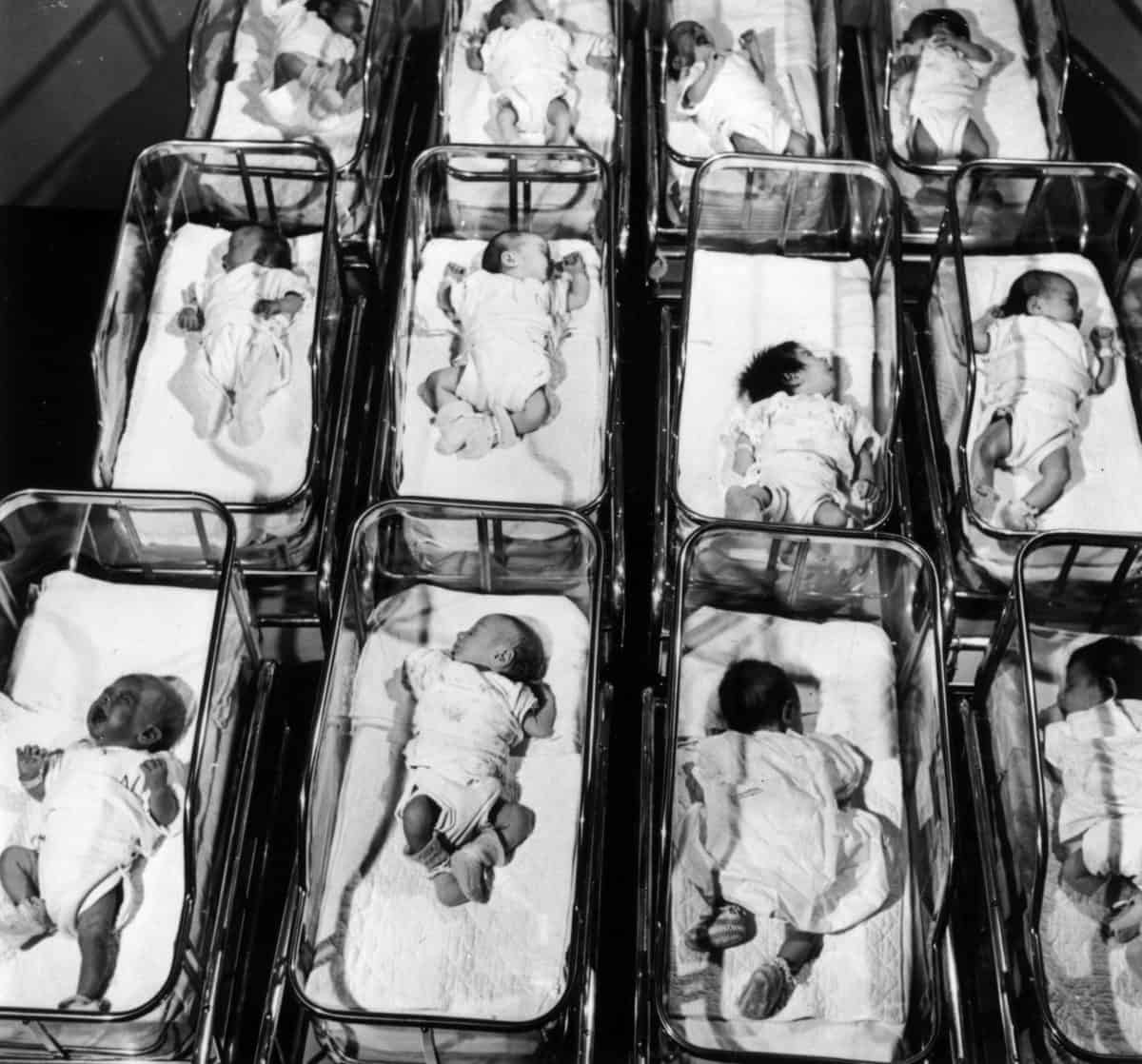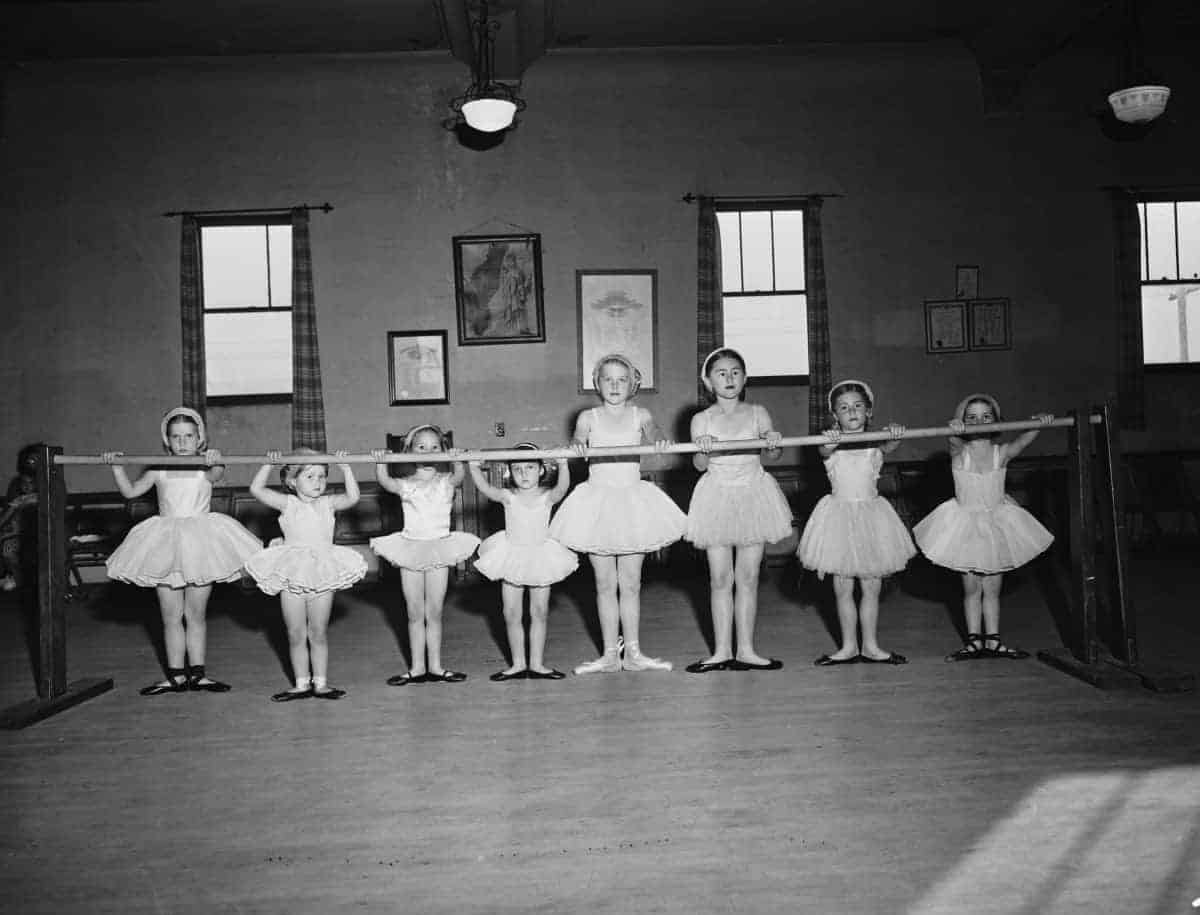Parenting today looks worlds different from how it did in the 1950s — and understandably so, given the more than 70 years of change, progress, and lessons learned. While the mid-20th century was undeniably a simpler time, many advancements since then have significantly improved child-rearing, like the invention of car seats to name just one. Let’s take a nostalgic journey back to the 1950s and explore what parenting looked like in that era.
Naptime

©Three Lions/ via Getty Images
As the saying goes, sleep when the baby sleeps. This Detroit dad took heed, circa 1955.
Full House

©Three Lions/ via Getty Images
This hospital maternity ward was packed with babies galore back in 1950. Note some babies are sleeping on their backs and others on their tummies.
Laundry Day

©Doreen Spooner/ via Getty Images
Though the earliest clothes dryer was invented in the late 19th century, it wasn’t until the mid-20th century that they became more accessible for average Americans. Till then, clothing was clothesline-dried.
A Day at the Races

©Hulton Archive/ via Getty Images
Forget the Kentucky Derby. At New Jersey’s Palisades Amusement Park circa 1955, babies raced … or crawled … for the gold. Parents enticed their tiny crawlers with toys as the contestants were cheered on by onlookers.
Snazzy Desk Design

©FPG/ via Getty Images
Long before Smartboards and laptops, students learned via chalkboards and paper and pencils. Desks featured tilt-top capabilities, allowing for a more comfortable way to read and write. Daily learning supplies were contained within.
A Hole in the Plan

©Harry Kerr/ via Getty Images
Today’s parents are urged to put their babies “back to sleep,” which is to say, have the babies sleep on their back to avoid suffocation from undeveloped neck muscles. However, in 1956, there was a novel idea of letting a baby sleep on its stomach (which many argue helps a baby sleep better) on a foam rubber pillow with holes to provide air and prevent suffocation.
Playground Fun

©Vermilya/ via Getty Images
Well before padded rubber play surfaces and durable plastic climbing equipment, children climbed on metal jungle gyms and monkey bars, which were typically located on dirt, grass, or blacktop pavement.
Birth of Suburbia

©FPG/ via Getty Images
Long before McMansion subdivisions with HOAs, suburban neighborhoods were sprouting up to provide family-friendly and affordable housing. Kids played freely with other neighborhood kids.
What Screen?

©Doreen Spooner/ via Getty Images
Though televisions had been invented and were becoming more commonplace, it wasn’t until the late 1950s that a majority of American homes had one. Before that, families gathered together and played games, read newspapers or magazines, or partook in hobbies, such as needlepoint.
The More Things Change…

©FPG/ via Getty Images
Back in 1950, New York protesters opposed the closure of a childcare facility. Says one sign, “If Mom can’t work, we can’t eat.” Today’s argument is that while we have adequate numbers of childcare facilities, the tuition cost makes them nearly impossible for many American families to afford.
Library Class

©Archive Photos/ via Getty Images
In this photo, circa 1950, a librarian shares a story with a captive audience of students during “library class.”
Teach Them Young

©Douglass Grundy/ via Getty Images
In this image, circa 1950, students learn the rules of the road as the teacher shows them various street sign shapes and explains their meanings. Note the notice in the background for “Bank Day” taking place the following day.
Shopping: A Family Affair

©FPG/ via Getty Images
Grocery carts may have been invented in 1937, but the ones with the little cars attached that keep kids busy while parents shop were not available until well after the 1950s. Here, a mom looks suspiciously happy and her kids remarkably well-behaved after loading up on groceries.
Social Media

©FPG/ via Getty Images
Comic books have been a favorite reading selection of kids for more than a century. Here, some boys browse the options at a newsstand in 1955.
What ATM?

©Three Lions/ via Getty Images
Long before the ATM was invented (which was in 1967, by the way), and still longer before online banking was a thing (the first online banking website launched in 1994), students pictured here participated in a “Society for Savings” program at their school, which taught them how to deposit and withdraw money.
Pre-Dance Moms

©Archive Photos/ via Getty Images
Abby Lee Miller wasn’t even born till 1965, which means these tiny dancers (and their moms) had a slightly less dramatic dance experience. Here members of La Petite Ballet Russe dance school in Burbank, CA, take to the barre in 1950.
Make Your Voice Heard

©FPG/ via Getty Images
These little ones take their voting rights seriously when casting their ballot for the new mayor of “Tots Town” in New York City.
Dental Visit

©Archive Photos/ via Getty Images
And finally, sometimes there are some things that are timeless, such as dentist visits. Some kids love them, others not so much.
